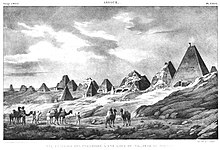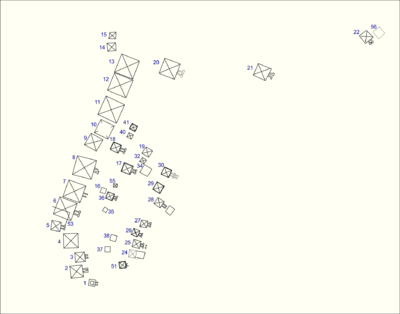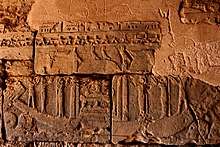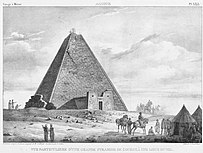Pyramids of Meroë
The Pyramids of Meroë are part of the larger group of Nubian pyramids, built at the time of the Kushite Kingdom over a period close to a milenium. Near Meroë, three royal cemeteries were constructed.[1]
- South Cemetery features nine royal pyramids. Four of the pyramids belonged to Kings and five belonged to queens. One hundred and ninety-five other tombs complete the cemetery.
- North cemetery contains forty-one royal pyramids. Thirty belonged to kings, six to queens and five to other royals. The cemetery has three more non-royal tombs for a total of forty-four.
- West cemetery is a non-royal site. It contains some one hundred and thirteen tombs.[2]
.jpg) Pyramids of Meroë | |
 Shown within Northeast Africa  Pyramids of Meroë (Sudan) | |
| Location | Northern State, Sudan |
|---|---|
| Region | Nubia |
| Coordinates | 16°56′18″N 33°44′57″E |
| Type | Settlement |
| Site notes | |
| Condition | restored |
Destructions
Great pyramid N6 , belonging to Queen Amanishakheto, before and after its destruction by the treasure-hunter Giuseppe Ferlini in the 1830s

Nubian pyramids of Meroë in 1821, by Frédéric Cailliaud
The West Cemetery at Meroë
Southern Cemetery at Begarawiyah
The Southern Cemetery of Meroë
The southern cemetery is the burial place of the Meroitic side of the royal family from ca 720 - 300 BCE. Towards the end the cemetery became the main royal burial site for the Kings of Meroë.[3] This cemetery contains several pyramids:[2]
- Beg.S 1 - Queen's pyramid (anonymous)
- Beg.S 2 - Queen's pyramid (anonymous)
- Beg.S 3 - Queen's pyramid (anonymous)
- Beg.S 4 - King's sister, King's Mother, Kenreth = Saleran? (or Saluwa?).
- Beg.S 5 - King Amanislo
- Beg.S 6 - King Arqamani or King Khnum-ib-re(?)
- Beg.S 9 - Queen's pyramid (anonymous)
- Beg.S 10 - King Kalka Kaltaly
- Beg.S 20 - Prince Weteriken (?), son of Amaniastabarqa or Siaspiqa[4]
- Beg.S 85 - Princess Mernua, contemp. King Anlamani - Aspelta[4]
- Beg.S 500 - Prince Kariben, son of King Siaspiqa or King Nasakhma [4]
- Beg.S 503 - Queen Khennuwa, approximately time of Nastasen [3]
North Cemetery at Begarawiyah

The North Cemetery

Detail of Pyramid Chapel Beg. N1
After the southern cemetery was full, the burials continued in the north. This site contains the royal burials of the Kings and Queens of Meroë from ca 300 BCE to about 350 AD.[3] The northern cemetery contains many royal pyramids:[2]
- Beg. N1 - Kandake Amanitore
- Beg. N2 - King Amanikhabale[3]
- Beg. N3 - Queen's Pyramid (unidentified)
- Beg. N4 - King Amantekha
- Beg. N5 - Prince Arikhankharer, son of Amanitore
- Beg. N6 - Kandake Amanishakheto
- Beg. N7 - King Arqamani (Merqetek)
- Beg. N8 - Nahirqa(?) (Nayakhensan-mery-Isis ?).
- Beg. N9 - King Tabirqo (Adikhalamani ?)
- Beg. N10 - King Shorkaror or Arikhankharer
- Beg. N11 - Queen Shanakdakhete
- Beg. N12 - Kandake Shanakdakhete
- Beg. N13 - King Naqyrjinsan[5]
- Beg. N14 - King's Pyramid (unidentified)
- Beg. N15 - King's Pyramid (unidentified)
- Beg. N16 - King Akhyesteme?
- Beg. N17 - King Amanitenmemide, Nebmaatre I
- Beg. N18 - Queen Amanikhatashan
- Beg. N19 - King Tarekeniwal
- Beg. N20 - King's Pyramid (unidentified)
- Beg. N21 - King's Pyramid (unidentified)
- Beg. N22 - King Natakamani
- Beg. N24 - King's Pyramid (unidentified)
- Beg. N25 - King's Pyramid (unidentified)
- Beg. N26 - Queen's Pyramid (unidentified)
- Beg. N27 - King's Pyramid (unidentified)
- Beg. N28 - King Teqerideamani I
- Beg. N29 - King Takizemani.
- Beg. N30 - King's Pyramid (unidentified)
- Beg. N32 - Queen's Pyramid (unidentified)
- Beg. N34 - King Artanyeszeme, Kheperkare III.
- Beg. N35 - Maniterara(ze), Teraramani.
- Beg. N36 - King's Pyramid (unidentified)
- Beg. N37 - Unknown.
- Beg. N38 - King's Pyramid (unidentified)
- Beg. N40 - King's Pyramid (unidentified)
- Beg. N41 - King's Pyramid (unidentified)
- Beg. N51 - King's Pyramid (unidentified)
- Beg. N52 - Unknown
- Beg. N53 - King's Pyramid (unidentified)
- Beg. N55 - Unknown.
- Beg. N56 - Prince's Pyramid (unidentified)
West Cemetery at Begarawiyah
- Beg. W14 - Nasapanasap
- Beg. W18 - Taktidamani
- Beg. W19 - Tedeqen
- Beg. W105 - Amanipilde
- Beg. W113 - King Mashadeakhel
- Beg. W342 - Atedekey
Nubian Pyramids
- Nubian pyramids
- The royal cemetery at el-Kurru. Buried here were Kashta, Piye, Tantamani, Shabaka and several queens are buried in pyramids at El-Kurru.
- The royal cemetery at Nuri. King Taharqa and other royals form the kingdom of Napata are buried at Nuri.
- Pyramids of Jebel Barkal
gollark: Imagine having things to do now.
gollark: Are they though? I mean, lots of them just have bad quirks for no apparent reason.
gollark: Um.
gollark: There are coordination problems involved.
gollark: SinthÖrion: does your thing just do HTML search queries and scrape the results or something?
References
- Dows Dunham (ed.); The Royal Cemeteries of Kush, volume V; 1963.
- G. A. Reisner, The Meroitic Kingdom of Ethiopia: A Chronological Outline, The Journal of Egyptian Archaeology, Vol. 9, No. 1/2 (Apr., 1923), pp. 34-77
- George A. Reisner, The Pyramids of Meroë and the Candaces of Ethiopia, Museum of Fine Arts Bulletin, Vol. 21, No. 124 (Apr., 1923), pp. 11-27
- Dows Dunham and M. F. Laming Macadam, Names and Relationships of the Royal Family of Napata, The Journal of Egyptian Archaeology, Vol. 35 (Dec., 1949), pp. 139-149
- Fontes Historiae Nubiorum II, p.686
This article is issued from Wikipedia. The text is licensed under Creative Commons - Attribution - Sharealike. Additional terms may apply for the media files.
